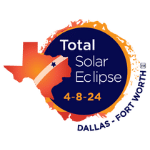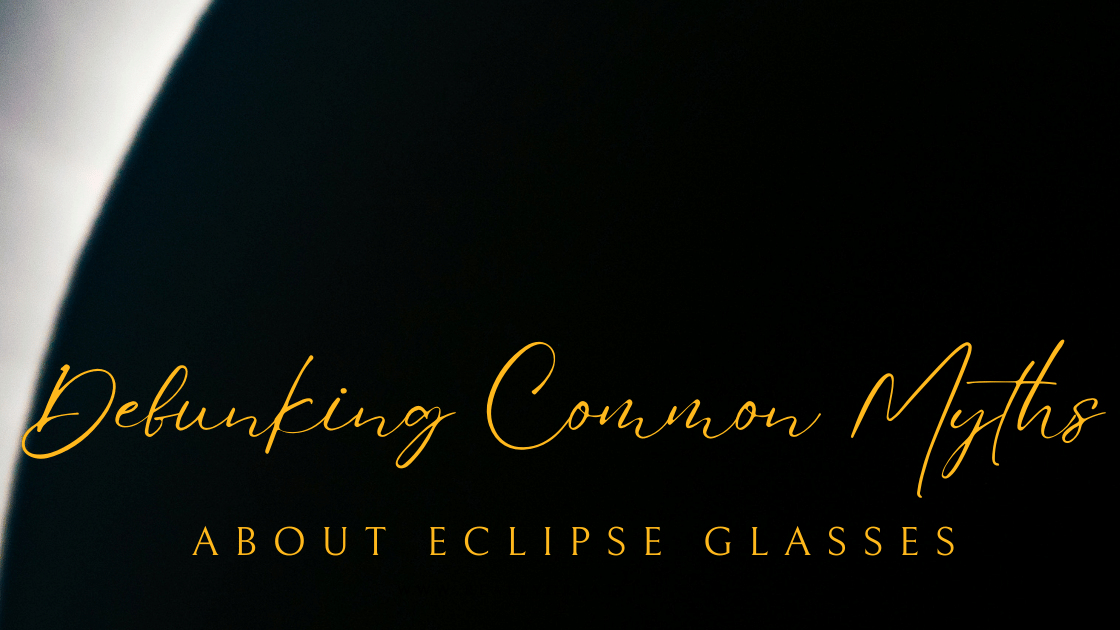Solar Eclipse Glasses Myths
On April 8, 2024, across Dallas-Fort Worth, we will experience a celestial dance between the Earth, the Moon, and the Sun, captivating the hearts and minds of people worldwide. However, the mystique of this awe-inspiring event sometimes leads to misconceptions and myths about how to safely view it. This blog will debunk some common myths and misconceptions surrounding Eclipse glasses, ensuring you can enjoy the wonder of a Solar Eclipse without risking your eye health.

Solar Eclipse Glasses Myth: Regular sunglasses are sufficient for Solar Eclipse viewing.
Fact: Regular Sunglasses are not designed for safe solar viewing. Eclipse glasses are specifically made to protect your eyes while looking directly at the Sun. The Sun’s intense brightness during an Eclipse can cause permanent eye damage if viewed without proper protection. Eclipse glasses have specialized filters that minimize the Sun’s brightness, allowing you to observe the Eclipse safely. Using regular Sunglasses while looking at the Sun directly can still expose your eyes, making them unsuitable for Eclipse viewing.

Solar Eclipse Glasses Myth: The Sun emits more ultraviolet rays during an Eclipse.
Fact: The misconception that the Sun emits more harmful ultraviolet (UV) light rays during an Eclipse is unfounded. In reality, the Sun’s behavior remains consistent whether there’s an Eclipse or not. The quantity of invisible ultraviolet (UV) light rays emitted by the Sun remains unchanged. What distinguishes a Solar Eclipse is its capacity to reduce the amount of visible light reaching Earth.

Solar Eclipse Glasses Myth: Any dark lens or homemade filter can be used for solar viewing.
Fact: Only NASA-approved Eclipse glasses or handheld viewers with the appropriate safety certifications should be used for solar viewing. Homemade filters or dark lenses may not provide adequate protection. Solar filters must meet specific safety standards, such as ISO 12312-2. Using unapproved filters or homemade alternatives can put your eyes at risk of damage. It’s crucial to rely on certified Eclipse glasses to safeguard your vision during a Solar Eclipse.

Solar Eclipse Glasses Myth: Eclipse glasses are unnecessary for partial Eclipses.
Fact: Even during a partial Eclipse, it’s essential to use proper Eclipse glasses or viewers. Looking at the Sun without protection can cause eye damage, regardless of whether it’s a partial, total Eclipse or just a regular Sunny day. The Sun’s intense brightness can overwhelm your eyes and lead to permanent vision impairment or blindness. Eclipse glasses are designed to reduce the Sun’s brightness to safe levels, allowing you to look directly at the Sun without risking your eye health. Always use Eclipse glasses or viewers when viewing uneclipsed or partially Eclipsed Sun.

Solar Eclipse Glasses Myth: Once you’ve used Eclipse glasses, you can reuse them indefinitely.
Fact: Eclipse glasses can degrade over time, especially if they are scratched or damaged. Always inspect your Eclipse glasses before use and replace them if necessary. Over time, Eclipse glasses may develop wear and tear, reducing their effectiveness. Scratches, cracks or any signs of damage can compromise their safety. Your eye health is paramount, and ensuring the integrity of your Eclipse glasses is essential for safe viewing.

Solar Eclipse Glasses Myth: Eclipse glasses need to be NASA Approved.
Fact: No. It’s important to clarify that NASA does not endorse or approve specific brands or products. The agency’s primary mission is to provide valuable information, safety guidelines and educational resources related to Eclipses. Nevertheless, NASA is crucial in promoting Eclipse safety by offering guidance on safe Eclipse viewing practices. This includes the recommendation to use proper eyewear, such as Solar Eclipse glasses that are verified by testing to meet ISO 12312-2 standards.
Solar Eclipse Glasses Myth: If my Eclipse glasses have the ISO logo, I am safe.
Fact: Unfortunately, no. Some bad players sell fraudulent Eclipse glasses. Your safest bet is to only purchase glasses from the American Astronomical Society (AAS) Reputable Vendors of Solar Filters & Viewers list.
Total Eclipse DFW proudly offers the Official Solar Eclipse Glasses of DFW, ensuring a safe and memorable viewing experience. Our glasses have undergone rigorous testing and meet ISO compliance standards, providing the highest level of eye protection during Solar Eclipses. Don’t compromise on safety; get your Total Eclipse DFW Solar Eclipse glasses today.

| #TotalEclipseDFW #EclipseGlassesMyths #SolarEclipseSafety #EclipseEyeProtection #TotalSolarEclipse #DFWEclipse #EclipseFacts #EyeHealth #EclipseSafety #2024Eclipse #EclipseTruth |



